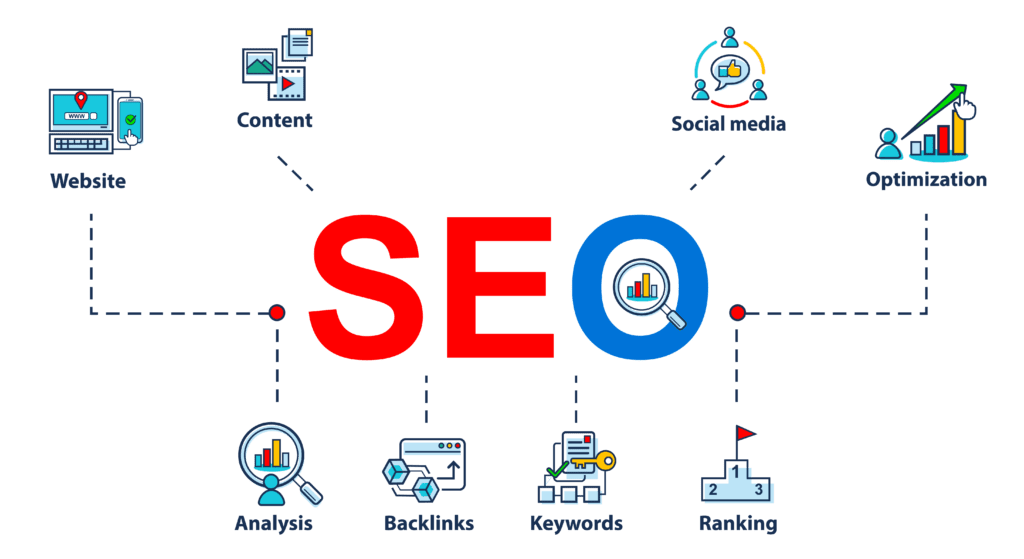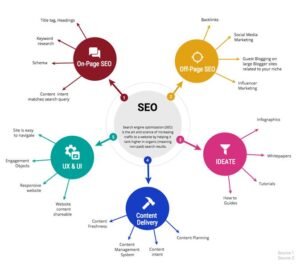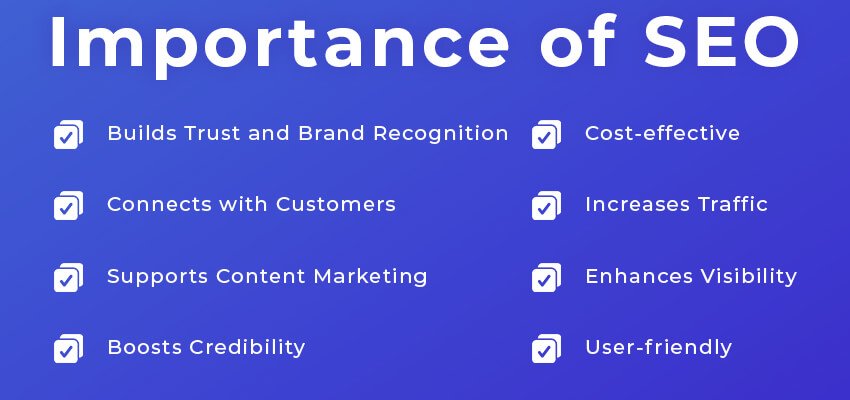Table of Contents
ToggleSEO Full Course For Beginners
A complete SEO (Search Engine Optimization) course for beginners involves several key areas of learning that will help you understand how to optimize websites to rank higher on search engines like Google. Below is a structured outline for a beginner-friendly SEO course:
Introduction to SEO
What is SEO?
- Definition and importance of SEO
- The role of search engines (Google, Bing, etc.)
- How search engines work (Crawling, Indexing, Ranking)
- Benefits of SEO (Organic traffic, Brand awareness, Cost-effectiveness)
SEO Terminology
Keywords:
What they are and why they matterSERP (Search Engine Results Page):
Understanding the results page layoutRanking Factors:
Overview of factors that impact rankingsBacklinks:
What they are and how they affect SEOOn-page and Off-page SEO:
Key differencesWhite-hat SEO vs Black-hat SEO:
Ethical vs unethical practices

Keyword Research
What is Keyword Research?
- Understanding user intent (informational, navigational, transactional)
- Long-tail vs short-tail keywords
- Keyword difficulty and competition
Keyword Research Tools:
- Google Keyword Planner
- Ubersuggest
- SEMrush
- Ahrefs
How to Choose the Right Keywords:
- Search volume
- Keyword difficulty
- Relevance to your content
On-Page SEO
On-page SEO involves optimizing the content and structure of individual web pages to improve their ranking in search engine results.
- Title Tags:
- Importance of title tags
- How to craft SEO-friendly title tags
- Meta Descriptions:
- Crafting compelling meta descriptions for higher CTR
- Headings and Subheadings (H1, H2, H3):
- Structure your content for readability and SEO
- URL Structure:
- SEO-friendly URLs (short, descriptive, and keyword-rich)
- Image Optimization:
- Proper image file names
- Alt text for accessibility and SEO
- Compressing images for faster page load times
- Content Optimization:
- Creating high-quality, engaging content
- Using internal links and external links
- Keyword density and natural placement
- Mobile-Friendliness:
- Mobile optimization importance for SEO
- Responsive design
- Page Speed:
- Why page speed matters for SEO
- Tools to test and improve page speed (Google PageSpeed Insights)

Technical SEO
Technical SEO focuses on optimizing your website’s infrastructure to ensure that search engines can crawl and index it effectively.
- XML Sitemaps: How to create and submit them
- Robots.txt: How to manage crawl directives
- Canonical Tags: Avoid duplicate content issues
- Site Structure: Importance of having a clear, organized site structure
- HTTPS: Why website security matters for SEO
- Structured Data (Schema Markup): Enhancing your site’s appearance on search engines with rich snippets
Off-Page SEO
Off-page SEO involves building a website’s reputation and authority on the web.
- Backlinks:
- What are backlinks and why they matter
- How to acquire high-quality backlinks
- Link building strategies (guest blogging, influencer outreach, broken link building)
- Social Signals:
- Role of social media in SEO (indirect impact)
- How social media can drive traffic and engagement
- Brand Mentions: Importance of brand mentions even without links
- Local SEO:
- Optimizing for local search
- Google My Business and local citations
Local SEO
- Google My Business (GMB):
- Setting up and optimizing your GMB profile
- Importance of NAP (Name, Address, Phone Number) consistency across directories
- Local Citations: Getting listed in local directories
- Local Reviews: Encouraging reviews to boost local rankings
- Local Keyword Optimization: Targeting location-based keywords

Content Marketing and SEO
Content marketing is central to a successful SEO strategy.
- Blogging for SEO: How blogs can help with ranking
- Creating Shareable Content: Content that gets links and social shares
- Content Updates: Refreshing older content to improve rankings
- Video SEO: Optimizing videos for search engines (YouTube SEO)
- User-Generated Content: Encouraging reviews, comments, and discussions
Measuring SEO Success
- Google Analytics: Setting up and understanding key metrics
- Google Search Console: Analyzing performance, indexing issues, and search queries
- SEO Tools: Other tools like SEMrush, Ahrefs, and Moz for monitoring SEO health
- Key Metrics to Track:
- Organic traffic
- Bounce rate
- Conversion rate
- Keyword rankings
SEO Tools for Beginners
- Free Tools:
- Google Analytics
- Google Search Console
- Google Keyword Planner
- Ubersuggest
- Paid Tools:
- SEMrush
- Ahrefs
- Moz Pro
- Screaming Frog SEO Spider
SEO Trends and Best Practices
- Voice Search Optimization: Adapting SEO strategies for voice search
- AI and SEO: How artificial intelligence impacts SEO (e.g., ChatGPT, RankBrain)
- E-A-T (Expertise, Authoritativeness, Trustworthiness): Google’s guidelines for content quality
- Core Web Vitals: How to optimize for user experience (UX) and technical performance

Common SEO Mistakes to Avoid
- Keyword Stuffing: Overusing keywords for ranking
- Ignoring Mobile Optimization: Failing to optimize for mobile-first indexing
- Low-Quality Backlinks: Gaining backlinks from spammy or irrelevant websites
- Neglecting Content Quality: Publishing content that doesn’t provide value to users
SEO Case Studies and Real-World Applications
- Learn from successful SEO campaigns.
- How businesses achieved higher rankings through strategic SEO.
Continuous Learning and Staying Updated
SEO is constantly evolving, so it’s essential to stay updated with the latest trends and algorithm updates (like Google’s Core Updates).
By following this course outline and applying the concepts through practice, you’ll be able to develop a strong foundation in SEO. Don’t forget that SEO requires patience, as results can take time to show.

